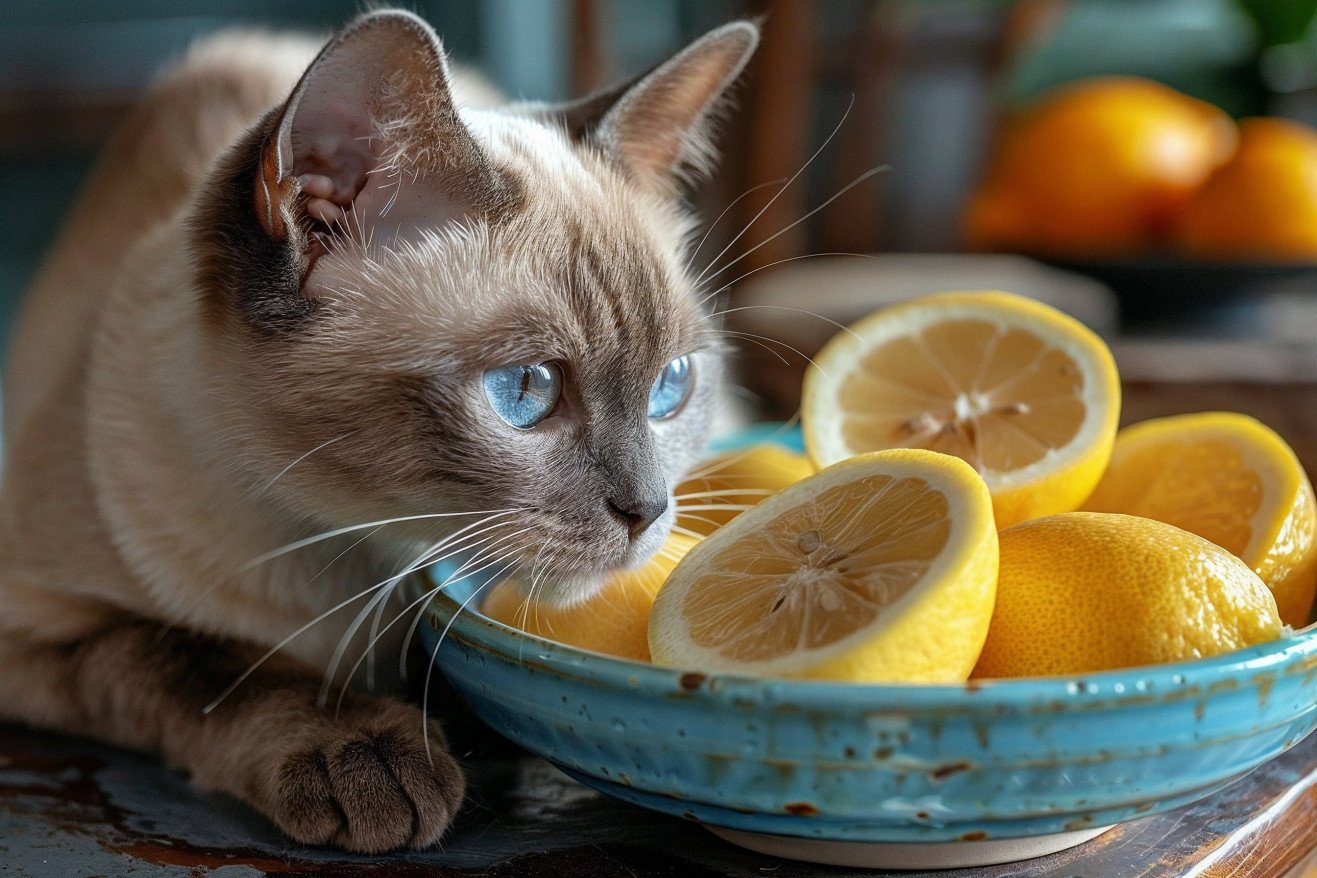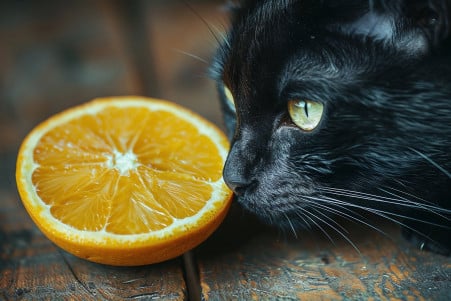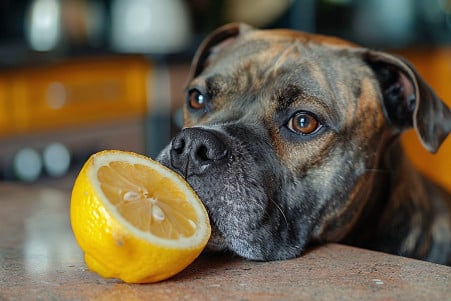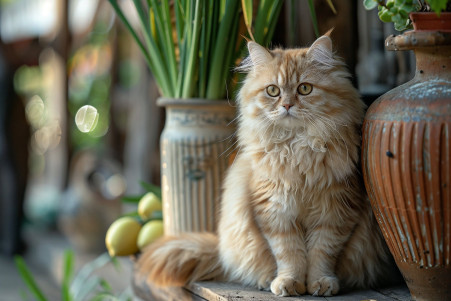Can Cats Eat Lemons? The Risks and Better Snack Options
30 April 2024 • Updated 30 April 2024

If you’ve ever been chomping on a lemon and noticed your cat’s curiosity, you may have asked yourself if cats can eat lemons. While cats can eat lemons in small amounts, it’s not recommended. Lemons are acidic and can lead to digestive problems and other health concerns for cats. In addition, cats may not like the smell of lemons. To be safe, it’s best to stick to treats that are made specifically for cats.
In discussing the science behind cats and lemons, we will cover nutritional research that has investigated the dietary requirements of cats, as well as veterinary research that has looked at citrus fruits and pet health. This interdisciplinary approach will help you better understand why you should avoid giving your cat lemon-flavored treats and will help you figure out what healthy options you can give your cat instead.
Can cats eat lemons?
Citrus Toxicity in Cats: What Is Citrus Poisoning?
Citrus fruits such as oranges, lemons, and limes contain essential oils and other compounds that are poisonous to cats. If a cat eats or otherwise comes into contact with citrus, they may exhibit signs of poisoning such as vomiting, diarrhea, drooling, weakness, and skin irritation. In more severe instances, citrus poisoning can result in seizures, tremors, and difficulty breathing.
The toxic compounds in citrus fruits that are harmful to cats are psoralens, limonene, and linalool, which can cause phototoxicity and gastrointestinal upset. In addition, eating the peel can result in choking or a blockage in the digestive tract due to the fact that the non-digestible material can get stuck in the cat’s throat or intestines, which can be fatal if not treated right away.
Cats that have been exposed to citrus require immediate medical attention, as treatment will involve decontamination, inducing vomiting, administering activated charcoal, and providing fluids if the cat becomes dehydrated. Even small amounts of citrus can cause stomach upset, so it’s important to make sure that these fruits are stored in a place where cats can’t get to them.
Lemon Toxicity: What It Means for Cats
Lemons, like other citrus fruits, contain psoralens and essential oils like limonene and linalool, which are toxic to cats. Catster explains that this means that cats can experience a variety of symptoms after coming into contact with lemons, including vomiting, drooling, changes in behavior, seizures, and skin irritation.
All parts of the lemon plant, including the fruit, leaves, and stems, are toxic to cats. The ASPCA even includes lemon on its list of plants toxic to cats because cats don’t have the enzymes needed to break down the compounds in lemons, which can lead to liver damage and other serious issues.
As Greg.app explains, cats don’t have the liver enzymes needed to break down the compounds in lemon essential oils, so if they ingest or come into contact with them through their skin, they can experience vomiting, breathing problems, and muscle tremors. To prevent lemon toxicity in cats, it’s important to seek veterinary care and take steps like making sure lemons and other citrus fruits are kept in places where cats can’t access them.
Safe and Healthy Snack Options for Cats
While lemons and other citrus fruits are toxic to cats, there are a number of human foods that are safe and healthy to give to cats as an occasional snack. Animal Trust explains that cats can eat cooked fish, such as salmon and prawns, which are common ingredients in cat food and can be a good source of important nutrients. Meanwhile, BeChewy says that apples, bananas, blueberries, and watermelon are some fruits that can be safe for cats to eat in small amounts, as long as they are free of seeds, stems, and pits.
Spinach, carrots, cucumbers, and green beans are some of the vegetables that can be given to cats as a healthy snack, but they should be washed and cooked before being given to cats. Pawlicy Advisor explains that it's important to talk to a vet before giving cats any new human foods and to make sure that snacks are a small part of a cat's daily calorie intake.
Emergency Response: What to Do If a Cat Ingests Lemon
If a cat accidentally ingests lemon or other citrus fruits, it’s important to act fast to reduce the risk of harm and ensure the cat gets the medical attention it needs. Per Cats Protection, symptoms of cat poisoning can include drooling, vomiting, diarrhea, seizures, difficulty breathing, and personality changes. If you suspect poisoning, call a vet immediately and don’t attempt to treat the symptoms yourself.
The vet may recommend a number of treatments based on the severity of the poisoning, including vomiting, activated charcoal, and supportive care such as IV fluids. Per AnimalGator, the sooner a cat is treated for poisoning after ingesting a toxic substance like lemon, the more likely it is to survive. This is why it’s so important to seek veterinary care right away, even if you think your cat has only ingested a small amount of lemon.
What Are the Long-Term Effects and Recovery Outcomes of Citrus Poisoning in Cats?
Cats are more susceptible to many toxins and drugs due to their small size and lower levels of certain liver enzymes, according to VCA Animal Hospitals. Common toxins that can be poisonous to cats include human drugs, insecticides, household cleaners, and human foods like onions, garlic, and chocolate.
Signs of poisoning in cats can range from gastrointestinal, neurological, respiratory, and skin issues to potential organ failure, says Cats.com. Many cats can make a full recovery from poisoning with immediate veterinary care and treatment, although some toxins can cause irreversible organ damage.
Knowing the signs of poisoning and acting quickly can make a big difference in a cat's recovery. Even a small amount of citrus fruit like lemon can cause an upset stomach, so it's important to be aware and keep these fruits out of a cat's reach.
Conclusion: How to Keep Your Cat Safe and Healthy With the Right Treats
Even though lemons and other citrus fruits can seem like a fun and healthy option for cats, they are actually very dangerous and potentially toxic. The compounds in citrus fruits, including psoralens and essential oils, can lead to a variety of issues, including digestive problems, skin problems, and even neurological problems.
It's important to make sure that lemons and other citrus fruits are kept away from cats and to make sure that you get your cat to the vet as soon as possible if you think that they may have ingested any. Instead of citrus fruits, cat owners can give their pets safer and healthier treats like cooked seafood, some fruits and vegetables, and other human foods that are safe for cats in moderation.
By paying attention to what your cat eats and making sure that you give them the right treats, you can help make sure that your cat stays healthy and happy.


